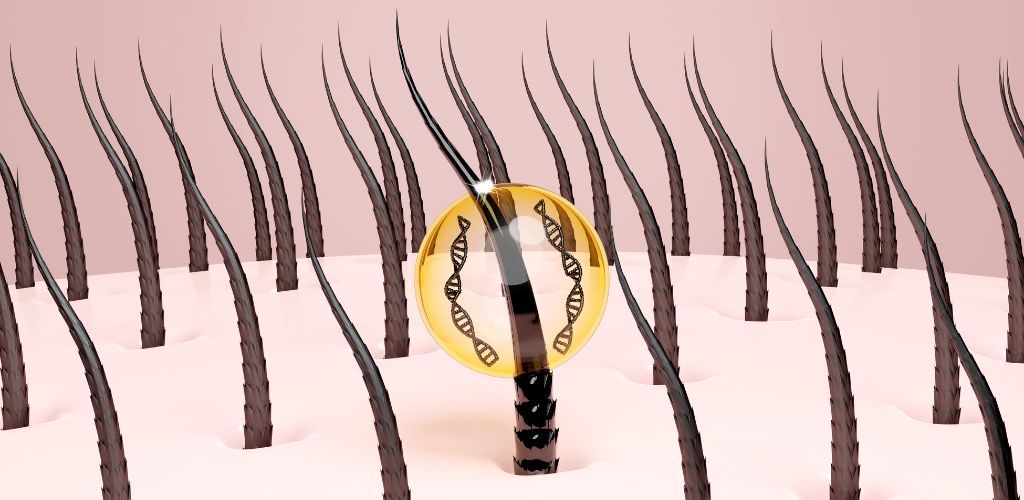Hair loss is a common problem that affects millions of people worldwide. While there are various factors that can contribute to hair loss, genetics play a significant role in determining an individual’s susceptibility to hair loss. In this blog, we will explore the genetics of hair follicle sensitivity and how it affects hair loss.
What is Hair Follicle Sensitivity?
Hair follicle sensitivity refers to the ability of hair follicles to respond to hormonal changes, stress, and other environmental factors. Hair follicles are sensitive to these factors because they are highly responsive to changes in the body’s hormonal balance. When the body experiences hormonal fluctuations, such as those that occur during puberty, menopause, or pregnancy, the hair follicles can become sensitive to these changes, leading to hair loss.
The Role of Genetics in Hair Follicle Sensitivity
Genetics play a significant role in determining an individual’s hair follicle sensitivity. Research has shown that genetic factors can influence the sensitivity of hair follicles to hormonal changes, stress, and other environmental factors. For example, studies have found that individuals with a family history of hair loss are more likely to experience hair loss themselves, suggesting that genetic factors can contribute to hair follicle sensitivity.
How Genetics Affects Hair Follicle Sensitivity
Genetics can affect hair follicle sensitivity in several ways. For example:
- Hormonal Sensitivity: Genetic factors can influence an individual’s sensitivity to hormonal changes, such as those that occur during puberty or menopause. This sensitivity can lead to hair loss, as the hair follicles become more responsive to hormonal fluctuations.
- Stress Response: Genetic factors can also influence an individual’s stress response, which can affect hair follicle sensitivity. When an individual experiences stress, their body releases cortisol, a hormone that can contribute to hair loss. Genetic factors can influence an individual’s ability to respond to stress, which can affect hair follicle sensitivity.
- Hair Follicle Size and Shape: Genetic factors can also influence the size and shape of hair follicles, which can affect hair follicle sensitivity. For example, individuals with smaller hair follicles may be more susceptible to hair loss due to hormonal fluctuations or stress.
The Impact of Genetics on Hair Loss
The genetics of hair follicle sensitivity can have a significant impact on hair loss. For example:
- Pattern Baldness: Genetic factors can contribute to pattern baldness, a common form of hair loss that affects millions of people worldwide. Pattern baldness is characterized by a receding hairline and thinning of hair on the crown of the head.
- Alopecia Areata: Genetic factors can also contribute to alopecia areata, a condition characterized by patchy hair loss. Alopecia areata is an autoimmune disorder that can cause hair loss on the scalp, face, or body.
- Telogen Effluvium: Genetic factors can also contribute to telogen effluvium, a condition characterized by excessive hair shedding. Telogen effluvium can be caused by hormonal fluctuations, stress, or other environmental factors.
How does hair follicle sensitivity impact overall hair health ?
Hair follicle sensitivity can significantly impact overall hair health in several ways:
- Increased susceptibility to hair loss: Genetic factors can make hair follicles more sensitive to hormonal changes, stress, and other environmental factors, leading to increased hair shedding and thinning.
- Impaired hair growth: Oxidative stress caused by an unhealthy scalp environment, often due to the presence of microbes like *Malassezia*, can negatively impact preemergent hair growth. This suggests that reducing scalp oxidative stress through targeted hair care products may help improve hair growth and quality.
- Scalp infections and inflammation: Sensitive hair follicles are more prone to infections like folliculitis, furunculosis, and carbunculosis, which can cause painful, sore, and inflamed scalp. These infections can further exacerbate hair loss and damage hair follicles.
- Altered hair texture and appearance: Genetic factors can influence hair follicle size and shape, which can affect hair texture and appearance. Sensitive hair follicles may produce finer, weaker hairs that are more prone to breakage.
- Increased risk of certain health conditions: Some studies suggest a link between male pattern baldness and an increased risk of prostate cancer and coronary artery disease, although more research is needed to establish a causal relationship.
In summary, hair follicle sensitivity, largely determined by genetic factors, can make hair more susceptible to shedding, impair growth, increase the risk of scalp infections and inflammation, and alter hair texture and appearance. Maintaining a healthy scalp environment and addressing underlying causes of sensitivity may help mitigate these negative impacts on overall hair health.
Conclusion
The genetics of hair follicle sensitivity play a significant role in determining an individual’s susceptibility to hair loss. Genetic factors can influence an individual’s sensitivity to hormonal changes, stress, and other environmental factors, which can contribute to hair loss. Understanding the genetics of hair follicle sensitivity can help individuals take steps to prevent or manage hair loss, such as maintaining a healthy diet, reducing stress, and using hair care products that promote hair growth. I hope this blog meets your requirements. Let me know if you have any further requests.
Citations:
[1] https://www.ncbi.nlm.nih.gov/pmc/articles/PMC6369642/
[2] https://www.healthline.com/health/scalp-tenderness
[3] https://www.healthline.com/health/hair-loss-and-testosterone
[4] https://www.webmd.com/skin-problems-and-treatments/ss/slideshow-hair-conditions
[5] https://www.hairmdindia.com/blog/scalp-sensitivity-causes-symptoms-treatment-hair-loss/




